Politics
Erdoğan reiterates diplomacy as he welcomes Iran-Israel cease-fire
Speaking at a news conference in Ankara on Tuesday before flying to the Netherlands for a leaders’ summit of NATO, President Recep Tayyip Erdoğan said they welcomed a cease-fire between Iran and Israel after days of reciprocal attacks. He underlined that diplomacy should be given a chance in the process. “Global actors should take efficient measures to end this craze. Otherwise, the whole world will pay the price for it,” he said.
Erdoğan highlighted that they undertook diplomatic efforts focusing on negotiations between the sides during the process, which began with Israel’s attack on Iran. “I had discussions with many leaders and met foreign ministers of the Organisation of Islamic Cooperation member states in Istanbul. We appreciate every effort on the road to a cease-fire. We certainly welcome the cease-fire agreement and call on the sides to fully comply with it. Our region cannot bear the impact of a conflict whose repercussions may be felt across the world. Diplomacy should be given a chance for the resolution of disagreements,” Erdoğan said. The president noted that Türkiye was committed to its stand based on international law.
“Israel’s attacks on Iran fueled a greater threat toward our region. Its reckless steps are unacceptable. We will continue to invite everyone to act with common sense and highlight that diplomacy is a solution to all issues,” he said. Erdoğan also criticized Israel over its actions in Gaza and called on Tel Aviv to stop “weaponizing hunger” in the Palestinian enclave. “A permanent cease-fire is immediately needed in Gaza. Israel’s aggression across our region should stop,” he said. His remarks echoed an earlier statement by the head of a U.N. agency, which accused Israel of engaging in a war crime by “shooting at people trying to get food.”
The controversial Gaza Humanitarian Foundation (GHF) began handing out food in Gaza on May 26 after Israel completely cut off supplies into the occupied Palestinian territory for more than two months, sparking warnings of mass famine.
The U.N. and major aid groups have refused to cooperate with the GHF over concerns it was designed to cater to Israeli military objectives.
“Israel’s militarized humanitarian assistance mechanism is in contradiction with international standards on aid distribution,” said U.N. human rights office spokesperson Thameen al-Kheetan. “The weaponization of food for civilians, in addition to restricting or preventing their access to life-sustaining services, constitutes a war crime.” Meanwhile, Philippe Lazzarini, the head of the U.N. agency for Palestinian refugees, UNRWA, slammed GHF as “an abomination that humiliates and degrades desperate people.” “It is a death trap costing more lives than it saves,” he told a press conference in Berlin.
Defense, ties with NATO
Erdoğan also stated that NATO members should unconditionally lift defense trade limitations. “We advocate reinforcing the security of Europe. We are developing our own defense capabilities and at the same time, contributing to the deterrence of the Alliance. So, it is not fair that the allies block the trade of defense products of others while we are working together for a stronger defense and a more efficient army,” he said. “Our country should be included in the defense initiatives of the EU and the Alliance,” he said. The United States imposed sanctions on Türkiye in 2020 after Ankara acquired the S-400 missile defense system from Russia. The move booted Türkiye out of its F-35 program. Türkiye also sought to acquire Eurofighter Typhoons built by a four-nation consortium of Germany, Britain, Spain and Italy, and reportedly faced opposition from Germany, though reports were not confirmed.
Hours before Erdoğan’s press conference, NATO Secretary General Mark Rutte praised Türkiye’s defense industrial base and said the country’s defense industry should be more closely connected with the U.K., Norway and the European Union.
“Türkiye has a very big defense industrial base. Sometimes (we) forget what they have. I visited some of their companies, it’s really impressive,” Rutte told the NATO Public Forum in The Hague. “We have to make sure that the Turkish defense industrial base is as closely connected as possible to the U.K., Norway and the European Union,” he added. Rutte warned against creating internal divisions within the alliance based on defense cooperation frameworks, saying: “Let’s not have these fences drawn up within NATO. It won’t help.”
Leaders of NATO’s 32 member states are gathering in The Hague on June 24-25 for the summit dominated by debates over increased defense spending and Ukraine’s membership bid.
In the meantime, the European Union is seeking a new direction in defense after President Donald Trump opted to distance the United States from European security. Having lost its most important ally, Brussels has focused on ensuring the security of the continent on its own, both due to pressure from Washington and the ongoing threats from Moscow. The European Commission announced a new strategy, known as the White Paper, on March 19, which includes increasing military expenditures and production, as well as allocating resources to joint defense projects until 2030. The EU, which seeks to share its topics of discussion and planned steps with NATO’s leading countries in defense, has created a platform for the exchange of ideas under the name of “like-minded countries” for the security of the continent. Türkiye, both a candidate country for the EU and a NATO ally, has also joined the platform, boasting defense industry breakthroughs in recent years.
“We are in close consultation with non-EU allies like ourselves regarding this matter. As NATO, we plan to address supporting measures for the European pillar,” Erdoğan said, ahead of the NATO Summit. He added that Türkiye, having contributed the most to NATO’s counterterrorism framework years ago, will also draw attention to what more the alliance should do in that area.
Istanbul talks
On the Russia-Ukraine conflict, Erdoğan said Türkiye was planning new steps for progress in the recent Istanbul talks it hosted between representatives of the two countries. He noted that Ukrainian President Volodymyr Zelenskyy would hold talks with NATO member countries. “We will convey our efforts for diplomacy to end the conflict. We recently had the sides meet in Istanbul and this paved the way for the exchange of prisoners. We have plans for more talks. We did everything for peace between Ukraine and Russia. We earned the trust of both sides and made tangible progress,” he said.
Erdoğan said the conflict cannot continue forever. “We will tell our counterparts at the NATO summit our vision and pledge we will not stop until peace is maintained,” he said.
Politics
Terror-free Türkiye commission continues work, determines members
As part of the new process in Türkiye to achieve a terror-free country, the parliamentary commission leading the process will meet for the third time on Tuesday.
Parliament Speaker Numan Kurtulmuş on Monday has asked the Justice and Development Party (AK Party), the main opposition Republican People’s Party (CHP), and the Peoples’ Equality and Democracy Party (DEM Party), to name one additional member each instead of the Good Party (IP), which did not participate in the National Unity, Fraternity and Democracy Committee. After the IP group announced its decision not to join the committee, a gap of three members emerged.
At the meeting, which will take place at 2 p.m., groups will submit proposals regarding the agenda. Commission chair Kurtulmuş will also share his own proposals with members. Deputies will also bring forward any individuals they would like the commission to hear from.
The committee, comprised of 48 lawmakers from most parties represented at Parliament, will weigh how the terror-free Türkiye initiative will proceed, especially in terms of laws and regulations regarding the status of the PKK terrorist group and its members. This may include lenient sentences for surrendering members of the group.
Although Parliament is in summer recess, the committee will continue to work without interruption. Kurtulmuş will serve as chairperson but is not eligible to vote in the committee’s voting processes. AK Party’s committee members include former Justice Minister Abdülhamit Gül. CHP’s committee members will consist of deputy parliamentary group chair Murat Emir, Deputy Chairs Gökçe Gökçen and Murat Bakan, and lawmakers from Istanbul, Diyarbakır, Ankara and Muğla. Among them are Türkan Elçi, the widow of Diyarbakır Bar Association’s former Chair Tahir Elçi, who died in 2015 in crossfire during a shootout between police officers and PKK members, and Sezgin Tanrıkulu, a prominent parliamentarian who has often made headlines for his heavy criticism of counterterrorism efforts.
The committee will not directly propose bills but will likely refer its reports to other subcommittees of Parliament, which will then discuss and vote on bills for their referral to the Parliament’s General Assembly. The General Assembly is the ultimate authority in Parliament to pass laws. Throughout its tenure, the committee will also hear statements of stakeholders involved or affected by the initiative, from the National Intelligence Organization (MIT), which monitors the PKK’s disarmament, to families of terror victims. The committee is expected to recommend amendments in counterterrorism laws and the Turkish Penal Code to accommodate the needs of the initiative, especially in terms of the situation of people convicted of terrorism or aiding and abetting the PKK.
‘Work to end by 2026’
Nationalist Movement Party (MHP) Chair Devlet Bahçeli on Sunday said that he expected all work regarding the terror-free Türkiye process would be completed by the end of the year.
According to a statement by Gülseven Media Group, with the representatives of which Bahçeli met, Bahçeli called on all political parties to support the works of the committee.
Saying that the PKK is acting in accordance with the organization’s jailed ringleader, Abdullah Öcalan’s call to dissolve opens the door for positive developments, Bahçeli added that the MHP is sincerely continuing their efforts to embody a climate of peace.
He said that the Kurdish population in Türkiye’s eastern and southeastern regions also supported the process and that this would ensure success.
Bahçeli emphasized that it is time for citizens everywhere to live in peace without the worry of terrorism.
The terror-free Türkiye initiative launched by Bahçeli had its first tangible progress in February when Öcalan accepted Bahçeli’s call and urged the group to lay down its weapons. In May, the PKK announced it would dissolve itself. Last month, some 30 PKK members, including a senior leader, burned their weapons in a ceremony in northern Iraq. Although symbolic, the gesture marked the first time that the group had laid down arms in its campaign of violence for more than four decades.
Politics
Azerbaijan, Armenia share text of peace deal signed in Washington
Azerbaijan and Armenia on Monday released the full text of their peace agreement, signed Friday during a U.S.-brokered trilateral summit in Washington.
According to the 17-point document shared by their foreign ministries, both countries recognized the borders of the Azerbaijani and Armenian republics in the Soviet Union as the boundary between the two states.
Both Baku and Yerevan confirmed that they do not have any territorial claims against one another and will not raise such claims in the future, the document noted.
It said that the two sides will refrain from using or threatening to use force against each other’s territorial integrity or political independence, and from interfering in each other’s internal affairs.
It further said that both countries will establish diplomatic ties once they exchange “instruments of ratification,” and conduct negotiations to delimit and demarcate their border.
Armenia and Azerbaijan agreed not to deploy any third-party forces along their border, it added.
The document also said both countries agreed to establish a bilateral commission to oversee the implementation of the peace deal, and withdraw mutual claims in international courts within a month after the deal enters into force, among other matters.
“The present Agreement is concluded in the Azerbaijani, Armenian, and English languages, with all three texts being equally authentic. In case of divergence as to the meaning of a provision under any of the authentic texts, the English text shall prevail,” it added.
The peace agreement between the two countries was signed on Friday by their foreign ministers amid a trilateral summit between Azerbaijani President Ilham Aliyev, U.S. President Donald Trump, and Armenian Prime Minister Nikol Pashinyan at the White House, formally ending over three decades of conflict.
Armenia and Azerbaijan have fought a series of cross-border wars since the late 1980s, including most recently in 2023, when Azerbaijan liberated its territory of Karabakh.
Politics
Erdoğan marks 11 years in power as first publicly elected president
A constitutional amendment that ended the largely ceremonial role of the president boosted President Recep Tayyip Erdoğan’s place in the annals of Turkish democracy. The charismatic leader whose party has won successive elections since 2002 marks 11 years in power on Sunday, as the first president directly voted into office by the nation.
During Erdoğan’s tenure as democratically elected president, Türkiye has weathered several crises and raised its diplomatic profile as a significant power broker and a force to reckon with, from mediating crises between Ethiopia and Somalia to the conflict between Russia and Ukraine and giving a powerful voice to Türkiye against Israel’s attacks on Gaza. At home, Erdoğan mobilized the nation and steered the recovery after the “disaster of the century” or earthquakes that killed tens of thousands of people in southern Türkiye in February 2023. Most recently, the People’s Alliance under the leadership of Erdoğan embarked upon an ambitious plan to disarm the PKK and end decades of violence by the terrorist group.
It was a rough path for Erdoğan, who himself and his party faced numerous challenges over the past two decades, but ultimately, the public’s will for true democracy won. Erdoğan had to wait seven years for the first direct presidential election, following a 2007 amendment that changed the election rules and was approved by a public referendum. Before the amendment, the presidency was a ceremonial role and Parliament elected the president. Opposition parties initially opposed the arrangement, but when the election date neared, they fielded their own candidates one after another. Erdoğan, the candidate of his Justice and Development Party (AK Party), was challenged by former Organisation of Islamic Cooperation (OIC) Secretary-General Ekmeleddin Ihsanoğlu, who was supported by the majority of opposition parties, and Selahattin Demirtaş, co-chair of the now-defunct Peoples’ Democratic Party (HDP).
Erdoğan secured more than 51.7% of the vote, becoming the 12th and first directly elected president of the Republic of Türkiye. Three years later, he won another victory for further changes to the presidential system, when more than 51% of the voters approved the executive presidency system, granting more powers to the president in a 2017 referendum. In 2018, another presidential vote was held, this time pitting Erdoğan against more challengers, but the veteran politician managed to beat his rivals again. His last election was in 2023 and Erdoğan etched his name in the annals of Turkish democracy again by defeating Kemal Kılıçdaroğlu, the joint candidate of a six-party opposition bloc, although this time in a runoff vote.
In a social media post on Sunday, AK Party’s deputy chair, Efkan Ala, marked the day and said the era of running Türkiye “without public consent” was “over.” “The irade is now idare,” he said, using Turkish words for “will” and “administration” respectively.
The presidency in its original form was a powerful authority, as evidenced during the tenure of Mustafa Kemal Atatürk, the country’s first president and founder of the Republic of Türkiye. His successor, Ismet Inönü, was branded as “National Chief” for his immense power that even continued when his Republican People’s Party (CHP) was in opposition. But after the 1960 coup that ousted President Celal Bayar from power, it became a mere symbol of “authority” without any real power, while the post of prime minister evolved into the actual seat of governance. The post only had its influence when former army chief Kenan Evren launched a coup in 1980 and installed himself as president. Before and after that coup, prime ministers and presidents rarely aligned, and this separation was most evident during the tenure of Ahmet Necdet Sezer, who infamously clashed with then-Prime Minister Bülent Ecevit in 2001 during a National Security Council meeting, paving the way for an economic crisis.
Ala said Erdoğan’s election was a turning point in Turkish history, marking a revolution that eliminated the shadow of “tutelage.” He was referring to the influence of a political and military elite that had threatened with a coup and occasionally succeeded in launching it in the past, whenever they felt their interests were threatened.
“This reform led by the AK Party strengthened national sovereignty, reinforced democratic representation and put the nation’s approval at the heart of politics. Decisions, authority and responsibility now are being shaped directly by the will of they people,” Ala said.
“National will is the strongest foundation. This step ensured that Türkiye continues its path stronger and decisively. We turned the page on the crisis stemming from the presidential elections,” he said.
Politics
Armenia eyes Türkiye deal after historic peace talks with Azerbaijan
Armenia and Azerbaijan’s move for a permanent peace raises hope for a normalization between Türkiye and Armenia.
Armenia’s deputy foreign minister described an “historic” trilateral summit with Azerbaijan and the U.S. at the White House as a turning point in Armenia-Azerbaijan normalization while creating an “important milestone” for same with Türkiye.
Vahan Kostanyan told Anadolu Agency (AA) on Saturday that the meetings marked “an important milestone,” one day after Armenian Prime Minister Nikol Pashinyan, Azerbaijani President Ilham Aliyev and U.S. President Donald Trump signed an agreement at the White House to end decades of conflict.
“Yesterday’s discussions, both bilaterally with the United States and trilaterally with the United States and Azerbaijan, were very important, even historic,” said Kostanyan. “We registered an important milestone when it comes to Armenia-Azerbaijan normalization, but also strengthening of the Armenia-U.S. sttrategic partnership.
He noted three key memoranda of understanding were signed between Armenia and the U.S., on capacity building for Armenia’s Crossroads of Peace project, cooperation in artificial intelligence and semiconductors, and on energy.
On the Armenia-Azerbaijan agreement, he highlighted that the peace treaty agreed in March had now been initialed. They also signed a letter on the dissolution of the OSCE Minsk Group, and the joint declaration witnessed by Trump.
Kostanyan praised previous statements by President Recep Tayyip Erdoğan that encouraged Armenia and Azerbaijan to conclude a peace treaty, saying they had “positively” affected normalization talks.
“With yesterday’s event, we see an important milestone and opportunity that we can achieve with Türkiye as well,” he said. “This connectivity project can be feasible and can be much more regionally and globally important if we call communications between Armenia and Turkey are relaunched as well.”
He expressed hope that Ankara would “reciprocate the goodwill of the government of Armenia” by opening the Turkish-Armenian border and establishing diplomatic relations.
“We can achieve another very important milestone for the stability and economic prosperity in our region, meaning that we’ll be able to open the border between Armenia and Türkiye and establish diplomatic relations,” he added.
After the collapse of the Soviet Union, Türkiye was among the first countries to recognize Armenia’s independence on Sept. 21, 1991, but closed its border and severed diplomatic ties in 1993 following Armenia’s occupation of Karabakh. Relations began to thaw after the 2020 Karabakh war, with both sides appointing special envoys to pursue normalization talks.
Türkiye on Friday welcomed progress toward establishing lasting peace between Azerbaijan and Armenia, following a declaration recorded in Washington on Aug. 8.
In a statement, the Foreign Ministry said the step comes at a time of intensifying global conflicts and crises, describing it as a highly significant development for ensuring regional peace and stability.
Ankara expressed appreciation for the contribution of the U.S. administration to the process and said a “historic opportunity” has emerged for achieving peace and prosperity in the South Caucasus.
“As Türkiye, we will continue to contribute to efforts aimed at seizing this opportunity and will support the devoted efforts of our dear Azerbaijan,” the ministry said.
The two countries share a complex history. Armenia for a long time accused Türkiye or rather, the Ottoman Empire, of committing genocide against Armenian population in the country during World War I. Türkiye has repeatedly denied the claims of genocide although it acknowledged high number of deaths among Armenians due to isolated incidents and diseases.
The Second Karabakh War, which ended in 2020, reignited hopes for renewed dialogue. In 2021, Ankara and Yerevan appointed special representatives tasked with normalizing relations and negotiating the reopening of their land border. So far, limited agreements have allowed third-country citizens and diplomats to cross, but a full reopening remains elusive.
Despite these hurdles, there have been tentative gestures toward cooperation. The Margara border crossing has been used twice in recent years for humanitarian purposes: in February 2023 to deliver Armenian aid trucks following a devastating earthquake in southeastern Türkiye, and in March 2024 for humanitarian aid shipments to Syria via Türkiye. Armenia has also upgraded the crossing in anticipation of future use.
In June, Pashinyan visited Türkiye and met President Recep Tayyip Erdoğan in a historic but somewhat muted visit. Two leaders expressed readiness for peace in their region and commitment to normalization of ties.
One of the key components of Friday’s agreement at the White House summit is the development of what is being called the Trump Route for International Peace and Prosperity (TRIPP), which will connect mainland Azerbaijan and its Nakhchivan Autonomous Republic exclave.
Kostanyan said the declaration envisions opening regional transportation and communication routes under the sovereignty, jurisdiction and territorial integrity of the states they traverse.
He explained that the project will be developed by Armenia and the U.S. on Armenian territory, enabling regional communications, including a link from southern Armenia through Nakhchivan to other parts of the country.
While the founding principles have been agreed, Kostanyan said technical and working-level discussions on the project’s modalities will follow.
Politics
Türkiye considers introducing family mediator system for divorces
Justice Minister Yılmaz Tunç told reporters on Sunday that they were weighing a family mediator system applied in other countries for the peaceful settlement of divorces.
Türkiye declared 2025 as “Family Year” in a bid to strengthen family bonds and promoting marriages to prevent a shrink due to its aging population. But divorces pose a challenge for the country as figures show that a slight but significant rise in divorces for 2024 compared to 2023. The number of divorces were 187,343 last year, according to official figures. Although divorces are amicable in most cases, some divorce proceedings drag due to disputes between spouses.
Speaking to journalists on the sidelines of an event in northern Türkiye’s Bartın, Tunç said they were preparing a new “judicial package” or an omnibus bill and were seeking input from experts to put the final touches before presenting it to Parliament for approval. Tunç said divorce cases should be separated from cases related to compensation and alimony and should be concluded faster. “When you have two separate lawsuits, one involving divorce and other about sharing of jointly owned properties and alimony, divorce proceedings tend to drag. Sometimes, they take 10 years and this prevents people from building new lives,” Tunç said.
The minister noted that they discussed it with experts, including judges of family courts and officials of higher courts. “We want to end the problems our citizens face in divorce proceedings,” he said.
Tunç said seeing a family mediator can be instrumental in helping the couples before the divorce cases. “This is applied in most European countries and Türkiye can implement a similar practice,” he said
“In some instances, lawyers encourage their plaintiffs to air severe complaints against their (soon-to-be-ex) spouses and this complicates a simple lawsuit filed due to less severe disputes between the sides. When faced those accusations, spouses believe they are at a point of no return. This also affects privacy of the couples before the court and hurts children,” he said.
“We believe that family mediation will help. It can help couples to settle on terms of divorce and will shorten the time of lawsuits. Moreover, it will help them to act more calmly even if they fail to come to terms with each other during the mediation period,” he added.
Politics
Turkish NGOs rally for humanitarian corridor into Gaza
Thousands of people gathered in the capital Ankara on Sunday for a major rally calling for a humanitarian corridor into the Palestinian enclave Gaza suffering under Israel’s genocidal attacks.
The rally, organized by the Ankara Palestine Solidarity Platform, a coalition of various nongovernmental organizations (NGOs), began after afternoon prayers at Kocatepe Mosque and concluded with a march to Parliament. Protesters carried banners reading “You cannot remain silent while children are dying” and “Humanitarian corridor to Gaza, now!” They voiced slogans against Israel.
Speaking on behalf of protesters, Ismail Mansur Özdemir said the ongoing blockade of Gaza had a horrible humanitarian toll. He said that a humanitarian intervention was necessary, though many people would likely continue to suffer from debilitating diseases and injuries. “We are seeing significant efforts around the world for opening a humanitarian aid corridor. As NGOs, we support noble efforts to break the Israeli blockade through convoys and vessels,” he said, referring to recent trips to Gaza by aid flotillas that were cut short by Israel’s intervention. Özdemir said that Türkiye, with its historic and moral responsibility, always sided with the oppressed in terms of humanitarian aid. “Establishing a humanitarian aid corridor into Gaza is a necessity, but Parliament should turn it into action. As NGOs, we appeal to Parliament to lead the creation of a humanitarian aid corridor by land, sea and air. All political parties should have a common will to that extent,” he said.
On Saturday, a similar rally to show support for Palestinians was held in Istanbul. Pro-Palestinian marches are commonplace in Türkiye, which strongly supports the Palestinian cause and Hamas’ resistance.
A U.N. official on Sunday warned the Security Council that Israel’s plans to control Gaza City risked “another calamity” with far-reaching consequences, as Israeli Prime Minister Benjamin Netanyahu insisted his goal was not to occupy the territory. The United Nations Security Council held a rare emergency weekend meeting after Israel said its military would “take control” of Gaza City in a plan approved by Netanyahu’s security cabinet that sparked a wave of global criticism. “If these plans are implemented, they will likely trigger another calamity in Gaza, reverberating across the region and causing further forced displacement, killings and destruction,” U.N. Assistant Secretary General Miroslav Jenca told the Security Council.
The U.N.’s humanitarian office, OCHA, said 98 children had died from acute malnutrition since the start of the conflict in October 2023, with 37 of those deaths since July, according to Gaza’s authorities.
“This is no longer a looming hunger crisis – this is starvation, pure and simple,” said OCHA’s coordination director Ramesh Rajasingham.
Palestine’s U.N. Ambassador Riyad Mansour said Sunday, “over 2 million victims are enduring unbearable agony,” calling Israel’s plans for Gaza City “illegal and immoral,” and urged foreign journalists to be allowed into Gaza.
Netanyahu announced on Sunday a plan to allow more foreign journalists to report inside Gaza, but accompanied by the Israeli military.
Britain, a close ally of Israel which nonetheless pushed for an emergency meeting on the crisis, warned the Israeli plan risked prolonging the conflict.
“It will only deepen the suffering of Palestinian civilians in Gaza. This is not a path to resolution. It is a path to more bloodshed,” said British deputy ambassador to the U.N. James Kariuki.
World Health Organization (WHO) chief Tedros Adhanom Ghebreyesus echoed that sentiment, calling the Israeli plan “deeply worrying, given the already dire humanitarian and health situation across the Strip.”
But Netanyahu said Sunday his country was “talking in terms of a fairly short timetable because we want to bring the war to an end,” as he insisted Israel did not want to occupy Gaza.
Outside the meeting at U.N. headquarters in New York, a small but noisy protest calling for an end to the conflict was met by a large police presence.
Algeria’s Ambassador Amar Bendjama called for sanctions on Israel in response to its Gaza City plan.
“The hour has come to impose sanctions on the enemy of humanity,” he said.
“If it were another country, you would have been imposing sanctions a long time ago,” the Palestinian envoy Mansour said.
-
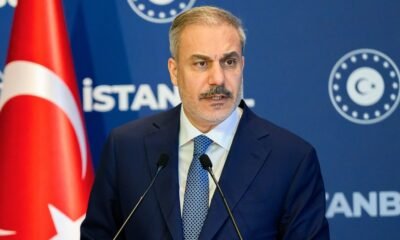
 Politics3 days ago
Politics3 days agoTurkish FM Fidan to visit Egypt to discuss Israel’s Gaza plan
-
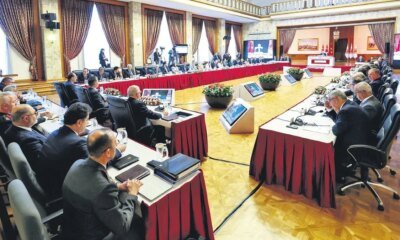
 Daily Agenda3 days ago
Daily Agenda3 days agoThe commission is a history step first buttoned the first button
-
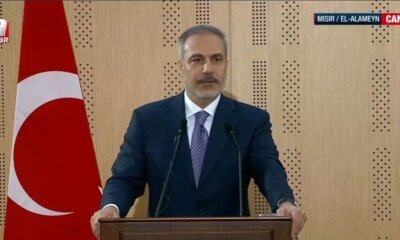
 Daily Agenda3 days ago
Daily Agenda3 days agoForeign Minister Fidan: Israel persistently sabotes cease -fire initiatives
-
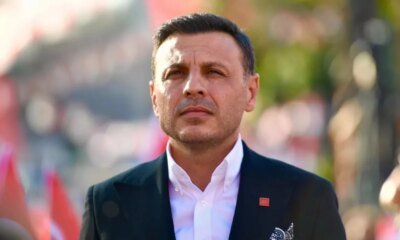
 Daily Agenda2 days ago
Daily Agenda2 days agoLawyer Mehmet Yıldırım and CHP Provincial Chairman Özgür Çelik Came Out
-
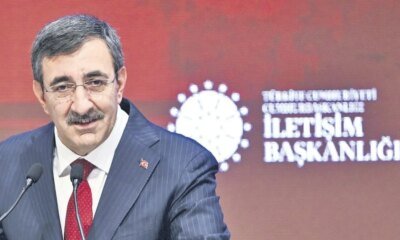
 Daily Agenda3 days ago
Daily Agenda3 days agoVice President Yılmaz: To create a chaos environment for their purpose
-
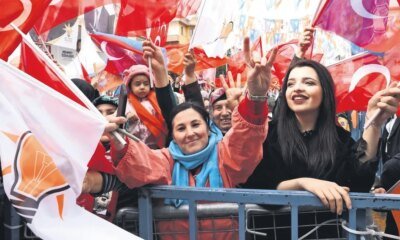
 Daily Agenda3 days ago
Daily Agenda3 days ago2 in Istanbul, 4 points in front of the CHP in front of Türkiye
-
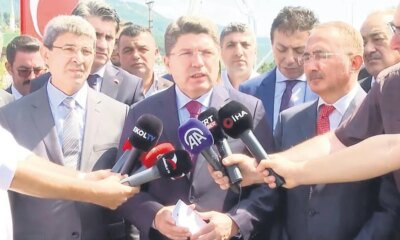
 Daily Agenda3 days ago
Daily Agenda3 days agoUYAP is one of the most reliable systems
-
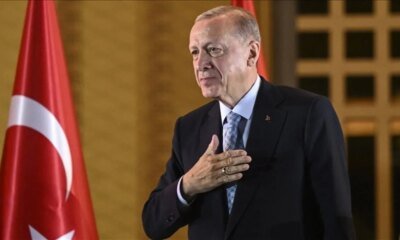
 Daily Agenda3 days ago
Daily Agenda3 days agoThe first President Erdoğan chosen by the public completed 11 years in office




